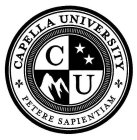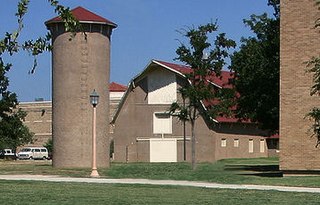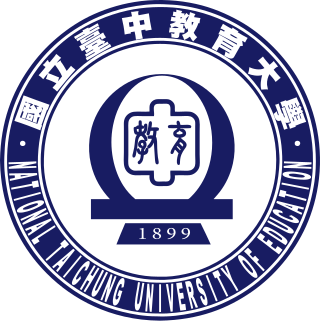Related Research Articles
Distance education, also known as distance learning, is the education of students who may not always be physically present at school, or where the learner and the teacher are separated in both time and distance. Traditionally, this usually involved correspondence courses wherein the student corresponded with the school via mail. Distance education is a technology-mediated modality and has evolved with the evolution of technologies such as video conferencing, TV, and the Internet. Today, it usually involves online education through an online school. A distance learning program can either be completely a remote learning, or a combination of both online learning and traditional in-person classroom instruction. Other modalities include distance learning with complementary virtual environment or teaching in virtual environment (e-learning).
Blended learning or hybrid learning, also known as technology-mediated instruction, web-enhanced instruction, or mixed-mode instruction, is an approach to education that combines online educational materials and opportunities for interaction online with physical place-based classroom methods.

Capella University is a private for-profit, online university headquartered in Minneapolis, Minnesota. The school is owned by the publicly traded Strategic Education, Inc. and delivers most of its education online.
Educational technology is the combined use of computer hardware, software, and educational theory and practice to facilitate learning. When referred to with its abbreviation, "EdTech", it often refers to the industry of companies that create educational technology. In EdTech Inc.: Selling, Automating and Globalizing Higher Education in the Digital Age, Tanner Mirrlees and Shahid Alvi (2019) argue "EdTech is no exception to industry ownership and market rules" and "define the EdTech industries as all the privately owned companies currently involved in the financing, production and distribution of commercial hardware, software, cultural goods, services and platforms for the educational market with the goal of turning a profit. Many of these companies are US-based and rapidly expanding into educational markets across North America, and increasingly growing all over the world."

Rosetta Stone Language Learning is proprietary, computer-assisted language learning (CALL) software published by Rosetta Stone Inc, part of the IXL Learning family of products. The software uses images, text, and sound to teach words and grammar by spaced repetition, without translation. Rosetta Stone calls its approach Dynamic Immersion.

Agricultural education is the systematic and organized teaching, instruction and training available to students, farmers or individuals interested in the science, business and technology of agriculture as well as the management of land, environment and natural resources.

Paragould High School is a public school serving grades nine through twelve located in Paragould, Arkansas. The campus is located at 1701 West Court Street in Paragould and is administered by Paragould School District. Oak Grove High School and Paragould High School consolidated into Ridgecrest High School in 1986 and it was voted to change the nickname to the Rams to accommodate this consolidation. After the 1996–1997 school year, the school's name was changed back to Paragould High School but maintained the Rams as mascot.

Sylvan Hills High School is an accredited comprehensive public high school located in the city of Sherwood, Arkansas, United States, serving grades nine through twelve. Sylvan Hills is one of four high schools administered by the Pulaski County Special School District (PCSSD). Prior to 1956, Sylvan Hills School instructed students through grade nine until local citizens gathered to approve expanding the school to a senior high, resulting in its first graduating class in 1959. Then, because of the increasing population in the surrounding communities, the school moved to its current campus adjacent to its former facilities starting in the 1968–69 school year.
Mountain Home High School Career Academies is a public secondary school in Mountain Home, Arkansas, United States. It is one of three high schools located in Baxter County and is the sole high school administered by the Mountain Home School District.
Acorn High School is a public high school serving students in grades 7 through 12 and is located in Acorn, an unincorporated area in Polk County, Arkansas, United States, near Mena.

Opelika City Schools (OCS) is a school district headquartered in Opelika, Alabama. The district is accredited by the Alabama State Department of Education and the Southern Association of Colleges and Schools. The school system enrolls approximately 4,300 students on nine campuses. Opelika has three primary schools with grades K–2, Southview, Jeter, and Carver, three intermediate schools with grades 3–5, West Forest, Northside, and Morris Avenue, Opelika Middle School with grades 6–8, Opelika High School with grades 9–12, and one at-risk school, Opelika Learning Center. Opelika's schools have traditionally had strong programs in technology and the arts.
Bryant High School (BHS) is a comprehensive public high school in Bryant, Arkansas, United States. BHS serves grades 10 through 12 and is a part of the Bryant Public Schools District. With more than 2,300 students, Bryant High School is the largest of four public high schools in Saline County, Arkansas.

The National Taichung University of Education is a university in West District, Taichung, Taiwan. Founded in 1899 at the Confucian Temple in Changhwa county, it moved to the current site in 1923.

The Arkansas Department of Education (ADE) is a cabinet-level agency of the Arkansas state government overseeing public education for K-12, higher education institutions, and career and technical education.

The Valencian International University (VIU) is a private university in Spain with an international remit. It was founded by the regional government of Valencia in 2008. 70% of it was later acquired by the Planeta publishing house. The university is officially recognized by the Spanish Ministry of Education. It is headquartered in Valencia, Spain.
Cabot Public Schools is a public school district system in northern Lonoke County, Arkansas, USA. It serves 10,292 students in grades K-12 across 17 campuses. This district includes students living in Cabot, Ward, and Austin. It is accredited by the Arkansas Department of Education.

The Concord Consortium was founded in 1994 as an educational research and development organization to create large-scale improvements in K-14 teaching and learning through technology.
Two Rivers High School (TRHS) is a public high school for students in grades 7 through 12 located in unincorporated Yell County, Arkansas, United States, on a section of Arkansas Highway 28 midway between Ola and Plainview. Two Rivers High School is administered by the Two Rivers School District.

Dover High School is a comprehensive public secondary school located in the rural, distant community of Dover, Arkansas, United States. The school educates more than 350 students annually in grades nine through twelve. Dover is one of five public high schools in Pope County and is the sole high school administered by the Dover School District. The first graduating class of six students, all female, completed studies in the spring of 1923.

In the United States, elementary schools are the main point of delivery of primary education, for children between the ages of 4–11 and coming between pre-kindergarten and secondary education.
References
- ↑ Arkansas Legislative Audit of distance learning Archived February 22, 2007, at the Wayback Machine
- ↑ ADE focus areas for distance learning [usurped]
- ↑ "ISTE article about distance learning". Archived from the original on 2009-10-06. Retrieved 2010-03-18.
- ↑ "ADE DLC Spanish Videos". February 14, 2010. Archived from the original on 2010-02-14.
- ↑ "USDLA award recipients". Archived from the original on March 8, 2009.
- ↑ "2008 USDLA award recipients" (PDF). Archived from the original (PDF) on 2010-02-02. Retrieved 2010-03-18.
- ↑ "USDLA award recipients" (PDF). Archived from the original (PDF) on 2010-02-02. Retrieved 2010-03-18.
- 1 2 "USDLA - United States Distance Learning Association".
- 1 2 ARDLA release